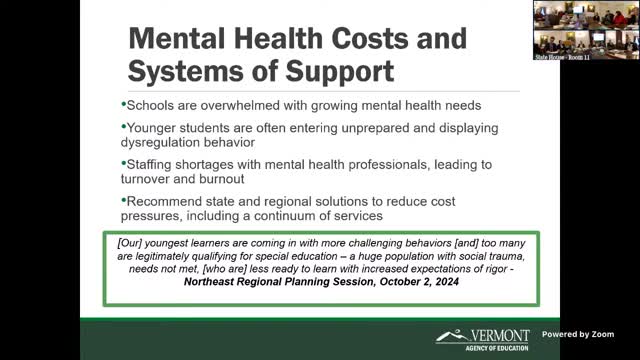Vermont schools report higher student mental‑health acuity and special‑education demand; AOE says costs cannot yet be quantified
Get AI-powered insights, summaries, and transcripts
Subscribe
Summary
Agency officials and regional participants described rising behavioral acuity among younger students, mismatched tiers of support, staffing shortages and long wait lists for therapeutic placements; the agency said coding inconsistencies prevent quantifying total mental‑health costs without new data collection
Jill Briggs Campbell, deputy secretary for the Agency of Education, told a joint House and Senate education committee that regional sessions repeatedly described increases in student mental‑health needs, growing special‑education demand and shortages of appropriately trained staff.
“Schools are seeing increased acuity,” Briggs Campbell said, summarizing what educators reported during regional planning sessions. That acuity included more severe externalizing and internalizing behaviors and occurrences among elementary‑age students, presenters said.
Committee members heard several recurring operational problems: shortages of school‑based mental‑health professionals and special‑education staff, long wait lists for therapeutic programs outside traditional schools, and mismatches between students’ needs and available community services. These pressures, staff said, were contributing to burnout among teachers and support staff.
Data and cost measurement Briggs Campbell told lawmakers the agency attempted a methodology to quantify mental‑health costs in schools but concluded current accounting and coding practices are inadequate. “We’re not going to be able to walk into this room and say to you all, ah, we’ve quantified the cost of mental health in our school system,” she said. The deputy secretary said district coding practices — for example, using broad categories such as “interventionists” that combine literacy and behavioral roles — make it impossible to isolate mental‑health spending without a new, targeted data collection.
The agency announced plans to deploy a class 5 data collection to capture finer‑grained information and said it will publish a special‑education report and a separate analysis of college and career readiness as follow‑ups to the tour.
Why it matters If districts are shouldering rising costs for high‑acuity students without clear state accounting, lawmakers said they need credible cost estimates to evaluate funding proposals. Agency officials told the committees that improved coding, new data collection and collaboration with districts will be prerequisites for reliable cost models.
Quote - “We’re not going to be able to walk into this room and say to you all, ah, we’ve quantified the cost of mental health in our school system,” Jill Briggs Campbell said.
Next steps The agency said it will produce a special‑education report and pursue targeted data collection this winter to answer outstanding questions about spending, staffing and service gaps. Committee members asked the agency to summarize conclusions and policy implications in advance of budget‑season deliberations.
